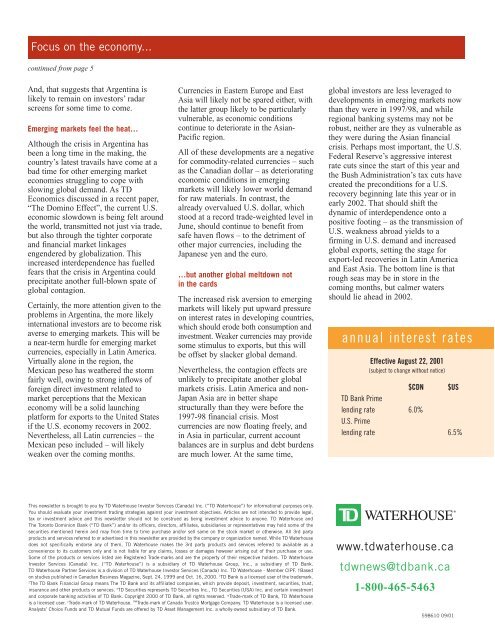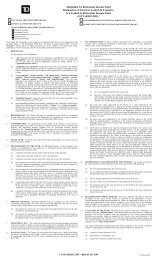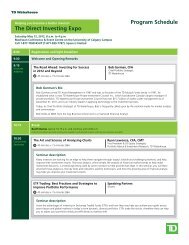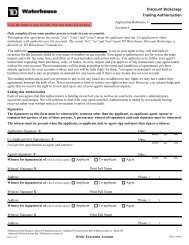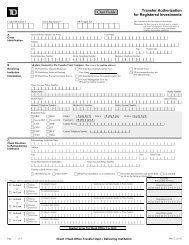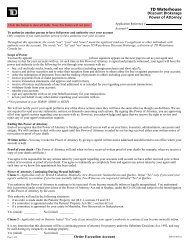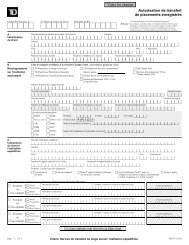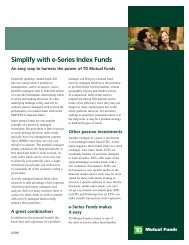New Markets & Research Portal WebBroker ... - TD Waterhouse
New Markets & Research Portal WebBroker ... - TD Waterhouse
New Markets & Research Portal WebBroker ... - TD Waterhouse
You also want an ePaper? Increase the reach of your titles
YUMPU automatically turns print PDFs into web optimized ePapers that Google loves.
Focus on the economy...<br />
continued from page 5<br />
And, that suggests that Argentina is<br />
likely to remain on investors’ radar<br />
screens for some time to come.<br />
Emerging markets feel the heat…<br />
Although the crisis in Argentina has<br />
been a long time in the making, the<br />
country’s latest travails have come at a<br />
bad time for other emerging market<br />
economies struggling to cope with<br />
slowing global demand. As <strong>TD</strong><br />
Economics discussed in a recent paper,<br />
“The Domino Effect”, the current U.S.<br />
economic slowdown is being felt around<br />
the world, transmitted not just via trade,<br />
but also through the tighter corporate<br />
and financial market linkages<br />
engendered by globalization. This<br />
increased interdependence has fuelled<br />
fears that the crisis in Argentina could<br />
precipitate another full-blown spate of<br />
global contagion.<br />
Certainly, the more attention given to the<br />
problems in Argentina, the more likely<br />
international investors are to become risk<br />
averse to emerging markets. This will be<br />
a near-term hurdle for emerging market<br />
currencies, especially in Latin America.<br />
Virtually alone in the region, the<br />
Mexican peso has weathered the storm<br />
fairly well, owing to strong inflows of<br />
foreign direct investment related to<br />
market perceptions that the Mexican<br />
economy will be a solid launching<br />
platform for exports to the United States<br />
if the U.S. economy recovers in 2002.<br />
Nevertheless, all Latin currencies – the<br />
Mexican peso included – will likely<br />
weaken over the coming months.<br />
Currencies in Eastern Europe and East<br />
Asia will likely not be spared either, with<br />
the latter group likely to be particularly<br />
vulnerable, as economic conditions<br />
continue to deteriorate in the Asian-<br />
Pacific region.<br />
All of these developments are a negative<br />
for commodity-related currencies – such<br />
as the Canadian dollar – as deteriorating<br />
economic conditions in emerging<br />
markets will likely lower world demand<br />
for raw materials. In contrast, the<br />
already overvalued U.S. dollar, which<br />
stood at a record trade-weighted level in<br />
June, should continue to benefit from<br />
safe haven flows – to the detriment of<br />
other major currencies, including the<br />
Japanese yen and the euro.<br />
…but another global meltdown not<br />
in the cards<br />
The increased risk aversion to emerging<br />
markets will likely put upward pressure<br />
on interest rates in developing countries,<br />
which should erode both consumption and<br />
investment. Weaker currencies may provide<br />
some stimulus to exports, but this will<br />
be offset by slacker global demand.<br />
Nevertheless, the contagion effects are<br />
unlikely to precipitate another global<br />
markets crisis. Latin America and non-<br />
Japan Asia are in better shape<br />
structurally than they were before the<br />
1997-98 financial crisis. Most<br />
currencies are now floating freely, and<br />
in Asia in particular, current account<br />
balances are in surplus and debt burdens<br />
are much lower. At the same time,<br />
This newsletter is brought to you by <strong>TD</strong> <strong>Waterhouse</strong> Investor Services (Canada) Inc. (“<strong>TD</strong> <strong>Waterhouse</strong>”) for informational purposes only.<br />
You should evaluate your investment trading strategies against your investment objectives. Articles are not intended to provide legal,<br />
tax or investment advice and this newsletter should not be construed as being investment advice to anyone. <strong>TD</strong> <strong>Waterhouse</strong> and<br />
The Toronto Dominion Bank (“<strong>TD</strong> Bank”) and/or its officers, directors, affiliates, subsidiaries or representatives may hold some of the<br />
securities mentioned herein and may from time to time purchase and/or sell same on the stock market or otherwise. All 3rd party<br />
products and services referred to or advertised in this newsletter are provided by the company or organization named. While <strong>TD</strong> <strong>Waterhouse</strong><br />
does not specifically endorse any of them, <strong>TD</strong> <strong>Waterhouse</strong> makes the 3rd party products and services referred to available as a<br />
convenience to its customers only and is not liable for any claims, losses or damages however arising out of their purchase or use.<br />
Some of the products or services listed are Registered Trade-marks and are the property of their respective holders. <strong>TD</strong> <strong>Waterhouse</strong><br />
Investor Services (Canada) Inc. (“<strong>TD</strong> <strong>Waterhouse</strong>”) is a subsidiary of <strong>TD</strong> <strong>Waterhouse</strong> Group, Inc., a subsidiary of <strong>TD</strong> Bank.<br />
<strong>TD</strong> <strong>Waterhouse</strong> Partner Services is a division of <strong>TD</strong> <strong>Waterhouse</strong> Investor Services (Canada) Inc. <strong>TD</strong> <strong>Waterhouse</strong> - Member CIPF. †Based<br />
on studies published in Canadian Business Magazine, Sept. 24, 1999 and Oct. 16, 2000. 1 <strong>TD</strong> Bank is a licensed user of the trademark.<br />
2 The <strong>TD</strong> Bank Financial Group means The <strong>TD</strong> Bank and its affiliated companies, which provide deposit, investment, securities, trust,<br />
insurance and other products or services. 3 <strong>TD</strong> Securities represents <strong>TD</strong> Securities Inc., <strong>TD</strong> Securities (USA) Inc. and certain investment<br />
and corporate banking activities of <strong>TD</strong> Bank. Copyright 2000 of <strong>TD</strong> Bank, all rights reserved. *Trade-mark of <strong>TD</strong> Bank, <strong>TD</strong> <strong>Waterhouse</strong><br />
is a licensed user. £ Trade-mark of <strong>TD</strong> <strong>Waterhouse</strong>. Trade-mark of Canada Trustco Mortgage Company. <strong>TD</strong> <strong>Waterhouse</strong> is a licensed user.<br />
Analysts’ Choice Funds and <strong>TD</strong> Mutual Funds are offered by <strong>TD</strong> Asset Management Inc. a wholly-owned subsidiary of <strong>TD</strong> Bank.<br />
global investors are less leveraged to<br />
developments in emerging markets now<br />
than they were in 1997/98, and while<br />
regional banking systems may not be<br />
robust, neither are they as vulnerable as<br />
they were during the Asian financial<br />
crisis. Perhaps most important, the U.S.<br />
Federal Reserve’s aggressive interest<br />
rate cuts since the start of this year and<br />
the Bush Administration’s tax cuts have<br />
created the preconditions for a U.S.<br />
recovery beginning late this year or in<br />
early 2002. That should shift the<br />
dynamic of interdependence onto a<br />
positive footing – as the transmission of<br />
U.S. weakness abroad yields to a<br />
firming in U.S. demand and increased<br />
global exports, setting the stage for<br />
export-led recoveries in Latin America<br />
and East Asia. The bottom line is that<br />
rough seas may be in store in the<br />
coming months, but calmer waters<br />
should lie ahead in 2002.<br />
annual interest rates<br />
Effective August 22, 2001<br />
(subject to change without notice)<br />
$CDN $US<br />
<strong>TD</strong> Bank Prime<br />
lending rate 6.0%<br />
U.S. Prime<br />
lending rate 6.5%<br />
www.tdwaterhouse.ca<br />
tdwnews@tdbank.ca<br />
1-800-465-5463<br />
598610 09/01


